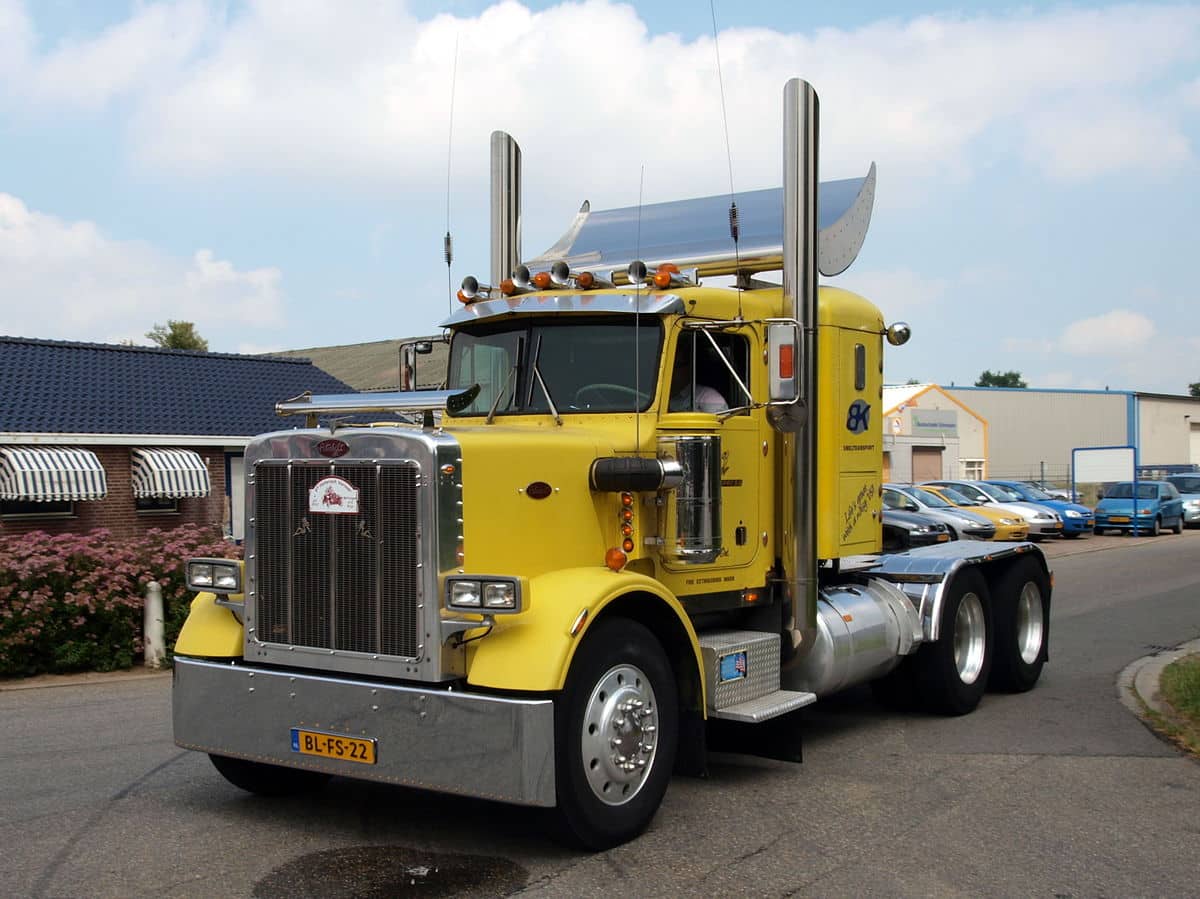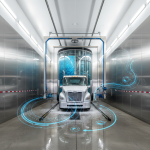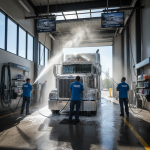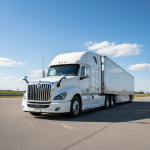Are you curious about the advanced technology that powers automatic wash equipment for 18-wheeler tractor trailers? In this article, we will take a closer look at the specialized technology driving these innovative cleaning systems.
Gone are the days of manual labor and time-consuming cleaning processes. With the latest advancements in automatic wash equipment, truck drivers and fleet owners can now maintain the cleanliness of their big rigs effortlessly.
Using cutting-edge technology, these machines are designed to efficiently remove dirt, grime, and other debris from every nook and cranny of an 18-wheeler tractor trailer. From the powerful water jets to the specialized brushes, each component works in harmony to deliver a thorough and consistent cleaning performance.
But that’s not all! These automatic wash systems also come equipped with advanced features such as sensor-based controls and programmable wash cycles, ensuring precise and reliable cleaning every time.
Whether you are a truck driver, fleet manager, or simply intrigued by the technology behind these specialized wash systems, this article will provide you with valuable insights into the mechanics and benefits of 18-wheeler tractor trailer automatic wash equipment.
So buckle up and get ready to dive into the fascinating world of automated truck washing!
Why specialized technology is necessary for washing 18-wheelers
Cleaning an 18-wheeler tractor trailer manually can be an arduous and time-consuming task. The sheer size of these vehicles, coupled with their intricate design, makes it challenging to access every nook and cranny. That’s where specialized technology comes in.
Automatic wash equipment for 18-wheelers is specifically designed to tackle the unique cleaning requirements of these massive vehicles. From the powerful water jets to the specialized brushes, each component is carefully crafted to ensure a thorough and efficient cleaning process.
The specialized technology behind these wash systems allows for precise control over water pressure, temperature, and detergent application. This ensures that even the most stubborn dirt, grime, and debris are effectively removed, leaving the 18-wheeler looking spotless and well-maintained.
With the help of advanced technology, truck drivers and fleet owners can now save valuable time and resources by relying on these automated wash systems. The specialized features of these machines make them an indispensable tool for keeping 18-wheelers clean and presentable.
Key components of 18-wheeler tractor trailer automatic wash equipment
To understand the technology behind automatic wash equipment for 18-wheelers, let’s take a closer look at its key components. These machines are a marvel of engineering, carefully designed to deliver optimal cleaning performance.
1. Water Jets: One of the essential components of an automatic wash system is the powerful water jets. These jets are strategically positioned to direct high-pressure water streams onto the surface of the 18-wheeler, effectively removing dirt and grime. The water pressure can be adjusted based on the specific cleaning requirements, ensuring a thorough yet gentle cleaning process.
2. Specialized Brushes: Another crucial component of the automatic wash equipment is the specialized brushes. These brushes are designed to reach every corner of the 18-wheeler, including areas that are hard to access manually. The bristles of the brushes are carefully designed to be both effective in cleaning and gentle on the vehicle’s surface, ensuring a scratch-free wash.
3. Detergent Dispensing System: To enhance the cleaning power of the automatic wash equipment, a detergent dispensing system is incorporated into the design. This system allows for the controlled application of cleaning agents, ensuring that the right amount of detergent is used for each wash. The detergents used are specially formulated to break down tough grime and grease, leaving the 18-wheeler sparkling clean.
4. Sensor-based Controls: Modern automatic wash systems are equipped with sensor-based controls that ensure precise and accurate cleaning. These sensors detect the size and shape of the 18-wheeler, allowing the machine to adjust its cleaning settings accordingly. This ensures that the wash process is optimized for each specific vehicle, delivering consistent results every time.
5. Programmable Wash Cycles: To further streamline the cleaning process, automatic wash equipment for 18-wheelers often comes with programmable wash cycles. Fleet owners and truck drivers can customize the wash settings based on their specific requirements. This flexibility allows for a tailored cleaning experience, ensuring that the 18-wheeler receives the care it needs.
Understanding the automated washing process for 18-wheelers
Now that we have explored the key components of automatic wash equipment for 18-wheelers, let’s delve into the automated washing process. Understanding how these machines work will shed light on their effectiveness and efficiency.
The automated washing process begins with the positioning of the 18-wheeler in the designated wash bay. Once in place, the machine’s sensors detect the dimensions of the vehicle, ensuring that the cleaning process is optimized for its size and shape.
Next, the water jets come into action. High-pressure streams of water are directed onto the surface of the 18-wheeler, effectively dislodging any dirt, grime, or debris. The water pressure can be adjusted to ensure a thorough cleaning while minimizing the risk of damage to the vehicle’s exterior.
Simultaneously, the specialized brushes start rotating and moving across the surface of the 18-wheeler. These brushes reach into every corner of the vehicle, ensuring that even hard-to-reach areas are cleaned effectively. The brushes are designed to be gentle on the vehicle’s surface, preventing any scratches or damage.
As the brushes do their job, the detergent dispensing system activates, applying a controlled amount of cleaning agent onto the surface of the 18-wheeler. The detergent breaks down any stubborn grime or grease, enhancing the cleaning power of the wash system.
Once the cleaning process is complete, the water jets rinse off the detergent and any loosened dirt, leaving the 18-wheeler looking spotless. Some advanced systems even incorporate a spot-free rinse feature, ensuring that no water spots or streaks are left behind.
The entire automated washing process is controlled by sophisticated software, which monitors and adjusts the various parameters to ensure a precise and consistent cleaning performance. This automation eliminates the need for manual labor, saving time and resources while delivering exceptional cleaning results.
Benefits of using specialized technology for 18-wheeler washing
The utilization of specialized technology in 18-wheeler washing offers numerous benefits for truck drivers, fleet owners, and the overall efficiency of the trucking industry. Let’s explore some of the advantages that these automated wash systems bring to the table.
1. Time and Labor Savings: With automatic wash equipment, the time and effort required for cleaning an 18-wheeler are significantly reduced. The automated process eliminates the need for manual labor, allowing truck drivers and fleet owners to focus on other essential tasks. This time-saving aspect translates into increased productivity and operational efficiency.
2. Thorough and Consistent Cleaning: The specialized technology behind these wash systems ensures a thorough and consistent cleaning performance. The powerful water jets, specialized brushes, and controlled detergent application work together to remove even the toughest dirt and grime. This level of cleanliness not only enhances the appearance of the 18-wheeler but also contributes to its overall maintenance and longevity.
3. Cost Savings: While the initial investment in automatic wash equipment may seem substantial, it offers long-term cost savings. By reducing the reliance on manual labor and minimizing the risk of damage to the vehicle’s surface, these wash systems can help decrease maintenance and repair costs. Additionally, the efficient use of water and detergent further contributes to cost savings.
4. Enhanced Image and Branding: A clean and well-maintained 18-wheeler is a reflection of professionalism and attention to detail. Using specialized technology for washing not only keeps the vehicles in top condition but also enhances the image and branding of the trucking company. A fleet of clean and impressive-looking 18-wheelers can leave a lasting impression on clients, potential customers, and the public.
5. Environmental Considerations: Automatic wash equipment for 18-wheelers often incorporates features that promote environmental sustainability. These machines are designed to use water and detergent efficiently, minimizing waste. Additionally, some systems incorporate water recycling capabilities, further reducing water consumption and environmental impact.
The benefits of using specialized technology in 18-wheeler washing go beyond just clean vehicles. It contributes to improved operational efficiency, cost savings, and a positive brand image for trucking companies.
Challenges and considerations in implementing 18-wheeler automatic wash equipment
While the use of specialized technology in 18-wheeler washing offers numerous advantages, there are also challenges and considerations that need to be addressed when implementing these automated wash systems.
1. Space Requirements: Automatic wash equipment for 18-wheelers requires a dedicated wash bay that can accommodate the size of these massive vehicles. Considerations need to be made regarding the available space, as well as any necessary modifications to the facility to accommodate the wash system.
2. Maintenance and Upkeep: Like any other piece of machinery, automatic wash equipment requires regular maintenance and upkeep. This includes routine inspections, cleaning of brushes and nozzles, and ensuring the proper functioning of all components. Having a maintenance plan in place is essential to ensure the longevity and optimal performance of the wash system.
3. Training and Education: Operating an automatic wash system for 18-wheelers requires specialized training and knowledge. Truck drivers and fleet personnel need to be educated on the proper operation of the machine, including safety protocols and troubleshooting procedures. Providing comprehensive training ensures the effective and safe use of the wash system.
4. Water and Detergent Supply: Automatic wash systems require a steady supply of water and detergent. Considerations need to be made regarding the availability and quality of these resources. Depending on the location, water conservation regulations may also need to be taken into account.
5. Integration with Fleet Management Systems: For fleet owners, integrating the wash system with existing fleet management systems can provide valuable insights and data. This integration allows for better monitoring of cleaning schedules, cost analysis, and performance evaluation. Ensuring compatibility and seamless integration is crucial for maximizing the benefits of the wash system.
Addressing these challenges and considerations is essential for the successful implementation of 18-wheeler automatic wash equipment. With proper planning and execution, the specialized technology can revolutionize the way trucking companies maintain their fleet of 18-wheelers.
Maintenance and upkeep of 18-wheeler tractor trailer automatic wash equipment
To ensure the optimal performance and longevity of automatic wash equipment for 18-wheelers, regular maintenance and upkeep are crucial. By following a comprehensive maintenance plan, truck drivers and fleet owners can maximize the efficiency and effectiveness of the wash system.
1. Routine Inspections: Regular inspections of the wash equipment are essential to identify any potential issues or malfunctions. This includes checking the brushes, nozzles, sensors, and control panels for wear and tear. Any damaged or worn-out components should be replaced promptly to prevent further damage to the wash system.
2. Cleaning and Lubrication: Keeping the brushes and nozzles clean is vital for optimal performance. Regularly remove any debris or buildup from these components to prevent clogs and ensure a consistent cleaning process. Additionally, lubricating moving parts, such as rotating brushes, helps reduce friction and prolong the life of the wash system.
3. Water and Detergent Management: Proper management of water and detergent is crucial for the efficient operation of the wash system. Regularly check the water supply for any impurities or contaminants that may affect the cleaning process. Similarly, ensure that the detergent dispensing system is calibrated correctly, and the detergent used is of high quality.
4. Staff Training: Providing comprehensive training to staff members operating the wash system is essential. They should be educated on the proper operation of the machine, safety protocols, and troubleshooting procedures. Regular refresher training sessions can help ensure that the wash system is used effectively and safely.
5. Recordkeeping and Documentation: Maintaining detailed records of maintenance activities, inspections, and repairs is essential. This documentation provides valuable insights into the performance and reliability of the wash system. It also helps identify any patterns or recurring issues that may require further attention.
By following a well-defined maintenance plan and incorporating regular upkeep activities, truck drivers and fleet owners can ensure that their automatic wash equipment for 18-wheelers remains in optimal condition. This proactive approach not only enhances the longevity of the wash system but also contributes to the consistent delivery of clean and well-maintained vehicles.
Case studies: Successful implementation of specialized technology in the trucking industry
To further understand the impact of specialized technology in the trucking industry, let’s explore a few case studies where the implementation of automatic wash equipment has been successful.
Case Study 1: ABC Trucking Company
ABC Trucking Company, a national logistics provider, faced challenges in maintaining their fleet of 18-wheelers across multiple locations. With a growing number of vehicles, manual cleaning became impractical and time-consuming. They decided to invest in automatic wash equipment specifically designed for 18-wheelers.
The implementation of the wash system resulted in significant time and labor savings for ABC Trucking Company. The automated process allowed for efficient cleaning of each vehicle, reducing the overall cleaning time by 50%. This time-saving aspect translated into increased productivity and improved operational efficiency.
Moreover, the consistent cleaning performance of the wash system enhanced the company’s image and branding. Clients and potential customers noticed the clean and well-maintained fleet, which led to an increase in business opportunities.
Case Study 2: XYZ Logistics
XYZ Logistics, a regional trucking company, faced challenges in meeting stringent cleanliness standards prescribed by their clients. They needed a solution that would ensure thorough and consistent cleaning of their fleet of 18-wheelers. After extensive research, they decided to implement automatic wash equipment specifically designed for the trucking industry.
The specialized technology behind the wash system allowed XYZ Logistics to achieve the desired level of cleanliness consistently. The powerful water jets and specialized brushes effectively removed dirt and grime from even the most hard-to-reach areas of the vehicles. This ensured compliance with their clients’ cleanliness standards, resulting in improved customer satisfaction and retention.
Additionally, the use of automatic wash equipment reduced the company’s reliance on manual labor and decreased cleaning-related expenses. This cost-saving aspect allowed XYZ Logistics to invest resources in other areas of their operations, further enhancing their competitive edge in the market.
These case studies highlight the positive impact of implementing specialized technology in the trucking industry. Automatic wash equipment offers practical solutions for maintaining large fleets of 18-wheelers, resulting in time and cost savings, improved cleanliness standards, and enhanced brand image.
Future advancements and trends in 18-wheeler automatic wash equipment technology
As technology continues to advance, the future of automatic wash equipment for 18-wheelers looks promising. Several trends and advancements are shaping the industry, offering exciting possibilities for truck drivers, fleet owners, and manufacturers alike.
1. Water Conservation: Environmental sustainability is becoming a key focus in the trucking industry. Future automatic wash systems are expected to incorporate advanced water recycling capabilities, minimizing water consumption and wastewater generation. These systems will help trucking companies reduce their environmental footprint while maintaining cleanliness standards.
2. Enhanced Sensor Technology: The integration of advanced sensor technology is set to revolutionize the automated washing process. These sensors will provide real-time data on the condition of the 18-wheeler’s surface, allowing the wash system to adjust its cleaning settings dynamically. This level of precision will ensure optimal cleaning performance while minimizing the risk of damage to the vehicle.
3. Artificial Intelligence (AI): AI-powered wash systems are on the horizon, offering intelligent and adaptive cleaning capabilities. These systems will learn from each wash cycle, continuously improving their performance based on the specific characteristics of the
Conclusion: The importance of specialized technology in keeping 18-wheelers clean and efficient.
When it comes to cleaning a massive 18-wheeler tractor trailer, manual labor is simply not feasible. That’s where automatic wash equipment comes in. These systems are specifically designed to handle the size and shape of these large vehicles, ensuring an efficient and thorough clean.
One of the key components of this technology is the powerful water jets. These jets are strategically placed to deliver high-pressure water streams that effectively remove dirt and grime from the surface of the truck. The force of the water is carefully calibrated to ensure effective cleaning without causing any damage to the vehicle.
In addition to the water jets, specialized brushes play a crucial role in the cleaning process. These brushes are designed to reach every nook and cranny of the truck, including the hard-to-reach areas. The bristles are made from durable materials that can withstand the rigorous cleaning process and effectively remove stubborn debris.
The combination of the water jets and brushes, along with the continuous movement of the equipment, ensures a consistent and thorough clean. These machines are engineered to cover the entire surface of the truck, leaving no spot untouched. With automated controls, the brushes move in a synchronized motion, ensuring every inch of the truck is cleaned efficiently.




